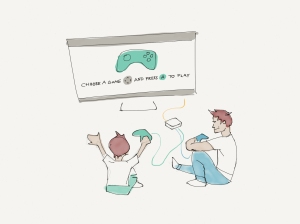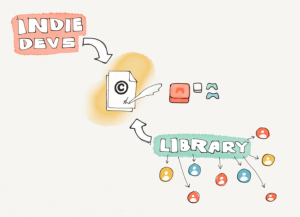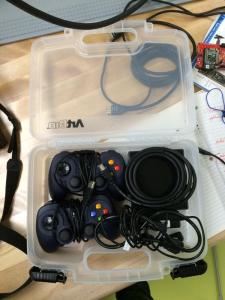Gamification
Community Arcade Gamification zombies
On board games
Olivier Charbonneau 2019-09-19
Here is a selection of books and other resources about board games. It came after a flurry of emails on academic listserv. Thank you to all of those who have suggested materials for this short bibliography !
Material on the Internet (aka “free stuff”)
Print or published material (aka “stuff you purchase or borrow from a library”)
| Author | Title | Place of Publication | Country of Origin | Publisher | Copyright Year |
| Tobin, Joseph | Pikachu’s Global Adventure: The Rise and Fall of Pokémon | Durham : | United States | Duke University Press | 2004 |
| Parlett, David | Parlett’s History of Board Games: By the Author of the Oxford
History of Board Games | Brattleboro | United States | Echo Point Books and Media | 2018 |
| Bell, R. C. | Board and Table Games from Many Civilizations | New York : | United States | Dover Publications | 1980 |
| Finkel, I. L. | Ancient Board Games in Perspective: Papers from the 1990
British Museum Colloquium | London | United Kingdom | British Museum Press | 2007 |
| Peterson, Jon | Playing at the World: A History of Simulating Wars, People and
Fantastic Adventures, from Chess to Role-Playing Games | San Diego, USA | United States | Unreason Press | 2012 |
| Arnaudo, Marco | Storytelling in the Modern Board Game : Narrative Trends from
the Late 1960s to Today : Narrative Trends from the Late 1960s to Today | Jefferson, UNITED STATES | United States | McFarland & Company, Inc. | 2018 |
| Murray, Harold James Ruthren | A History of Board-Games Other Than Chess | Oxford | United Kingdom | Oxbow Books | 2002 |
| Engelstein, Geoffrey | Building Blocks of Tabletop Game Design : An Encyclopedia of
Mechanisms | Boca Raton, FL : | United States | Taylor & Francis | 2019 |
| Parlett, David | Oxford Guide to Card Games | New York, USA | United States | Oxford University Press | 1990 |
| Livingstone, Ian | Board Games in 100 Moves | London | United Kingdom | DK Publishing | 2019 |
| Woods, Stewart | Eurogames: The Design, Culture and Play of Modern European
Board Games | Jefferson, USA | United States | McFarland & Company, Inc. | 2012 |
| Booth, Paul | Game Play: Paratextuality in Contemporary Board Games | New York, USA | United States | Bloomsbury Academic | 2015 |
| Knizia, Reiner | New Tactical Games with Dice and Cards | | | Blue Terrier Press | 2019 |
Copyright Gamification Librarianship
Support our project to get indie digital games in libraries
Olivier Charbonneau 2016-03-23
Suivez l’évolution de ce projet: http://www.culturelibre.ca/tag/knight/
Follow the evolution of this project here: http://outfind.ca/tag/knight/
I am really excited to share with you Concordia’s own Technoculture Art and Games’ (TAG) submission for the Knight Foundation’s News Challenge, here is the link:
https://www.newschallenge.org/challenge/how-might-libraries-serve-21st-century-information-needs/submissions/play-at-your-leisure
The goal is to get digital games from small (aka indie) studios into libraries. The benevolent Knight Foundation’s News Challenge is an open call for projects to fund innovative ideas and this current iteration focusses on Libraries.
The Knight Foundation has already granted us “prototype” funding last year to create our alpha prototype, codenamed Alice (family pictures on the proposal page). Now, we want to develop and test our library videogame system with partner libraries (Brooklyn NY, San José CA, Civilla in Detroit and with the Indigenous Futures communities in the North) over the next few years. The Knight Foundation focusses on the USA and rest assured that we will be seeking support to deploy our system in Canada and elsewhere!
Because the News Challenge uses an “open” community based evaluation process (in addition to a formal review), you can help in some very simple ways:
1. Please click on the link to get the page view count up.
2. Register an account on the system to either “heart” the proposal or leave a comment. Some useful comments could be “I would love for my local public library to have indie/digital games” or, if you are a game maker, “I would love for libraries to add my game to their collection” (or some variation thereof). Of course, please feel free to add your own comment!
3. Forward this email to anyone who believes that libraries should have Game Clubs and Indie Games.
The Comment phase of the granting cycle closes in about 2 week.
On a more personal note, my ambition is to strengthen libraries everywhere by devising an open social computing platform so that everyone can play and make games. This will also help libraries acquire and preserve digital content through open markets (fixing some pesky collective action & copyright & technological issues). I am blessed with a myriad of colleagues at Concordia who also share this vision and are willing to embark on this quest!
Thanking you in advance for your support of our project,
Olivier
Gamification Information Technology Librarianship
Project report to the Knight Foundation: Indie games for libraries
Olivier Charbonneau 2015-11-30
Aussi en français: http://www.culturelibre.ca/tag/knight/
Follow the evolution of this project here: http://outfind.ca/tag/knight/
I am very happy to report that the project report for the indie games licensing project is now available on the Technoculture Art & Games research center’s blog. 
Gamification Research
Indie Games Licensing for Libraries Presentation
Olivier Charbonneau 2015-07-17
Aussi en français: http://www.culturelibre.ca/tag/knight/
Follow the evolution of this project here: http://outfind.ca/tag/knight/

Here is the presentation I will be delivering to the Knight Foundation about the Indie Games Licensing for Libraries project.
This slide explains the main idea behind the project, namely connecting indie developers with libraries through a series of copyright contracts, also called licenses:

Gamification Information Technology Outfind.ca
Meet Alice, the first digital gaming kit for libraries
Olivier Charbonneau 2015-06-04
Aussi en français: http://www.culturelibre.ca/tag/knight/
Follow the evolution of this project here: http://outfind.ca/tag/knight/

Alice is the codename for the first prototype digital gaming kit for libraries
Above is a picture of our prototype, codename Alice for a few reasons:
- it is our “alpha” or A prototype;
- Alice, in encryption circles, tries to talk to Bob; and
- it is a “clin-d’oeil” to Lisa, Apple’s first computer with a graphical interface and my favorite character on the Simpsons
Many many thanks to the Knight Foundation for their wonderful support !!
My team of engineers are working hard on building a functioning prototype. We have selected a “stripped down” Linux distribution running Kodi as a platform. We picked some generic controllers, a hard plastic case and a mini-computers running on solid state memory (the Gygabyte Brix in fact).
They will hopefully deliver a first version of the device by late June. We will also deliver all our code via the usual open source venues (not sure which actually, but my team is keen on contributing their work back to the community quickly).
Afterwards, my team and I hope to visit with 2 public library systems: Montreal and Austin public libraries. We aim to discuss this project with library employees (administrators, professionals and staff), game developers and patrons. I have ethnographers working on our research instruments.
So, my team is busy with the work our grant has funded and we should have some tangible results in a month or so.
Please let me know if you have questions, ideas or comments, I am most interested in them! My email is: o.NOSPAMcharbonneau@concordia.ca (note to humans: please remove all capital letters from my email address to reach me).
Gamification Librarianship
Legacy Video Game Collection Simulator
Olivier Charbonneau 2015-06-01
I’ve been toying with documenting a burgeoning video/digital game collection for my institution. I took a stab at establishing some costs and space considerations for various assumptions. For example, average cost and sizes for consoles, controllers and games from years past… I’ve tried to capture some of the metrics and data I’ve gathered in this spreadsheet: Legacy Video Game Collection Simulator.
For the record, a legacy game collection implies physical objects embedded with digital media which are no longer commercially available.
(Special thanks to Darren Wershler, professor at Concordia University in Montréal, for his assistance in this project.
With it, you can modify the cost & size assumptions and generate model collections. Of course, it does not specify which exact consoles you would acquire for your collection, but it allows to generate some models one would plan budget or space requirements.
Please let me know if you have comments or questions!
Gamification
What about games in academic libraries?
Olivier Charbonneau 2015-04-15
Reading up on the subject of games in academic institutions
Scholarly articles & papers (slightly disorganized)
- Tappeiner, Elizabeth & Catherine Lyons, (2008) “Selection criteria for academic video game collections“, Collection Building, Vol. 27 Iss: 3, pp.121 – 125
- Kane, Danielle, Soehner, Catherine and Wei, Wei. “Building a collection of video games in support of a newly created degree program at the University of California, Santa Cruz” Science & Technology Libraries. Vol. 27 (4) 2007: 77-86
- Laskowski, Mary and Ward, David. “Perspectives on building next generation video game collections in academic libraries”. Journal of Academic Librarianship. Vol. 35 (3) May 2009: 267-273.
- Nicholson, Scott, 2013, “Playing in the Past: A History of Games, Toys and Puzzles in North American Libraries”, Library Quarterly 83(4), 341-361, available from: http://scottnicholson.com/pubs/playinginthepast.pdf
- (looks like a paper) New Directions for Academic Video Game Collections: Strategies for Acquiring, Supporting, and Managing Online Materials by Diane Robson and Patrick Durkee, University of North Texas
- Christopher M. Thomas, Jerremie Clyde, Game as Book: Selecting Video Games for Academic Libraries based on Discipline Specific Knowledge, The Journal of Academic Librarianship, Volume 39, Issue 6, November 2013, Pages 522-527, ISSN 0099-1333, http://0-dx.doi.org.mercury.concordia.ca/10.1016/j.acalib.2013.07.002.
(http://0-www.sciencedirect.com.mercury.concordia.ca/science/article/pii/S0099133313000888)
Keywords: Video games; Collections; History; Academic libraries
- A Unified Approach to Preserving Cultural Software Objects and their Development Histories, Kaltman, Eric, UC Santa Cruz; Wardrip-Fruin, Noah, UC Santa Cruz; Lowood, Henry, Stanford; Caldwell, Christy, UC Santa Cruz
News, blog posts & other documents (by date)
[youtube https://www.youtube.com/watch?v=gOonDY8vCJU&w=560&h=315]
- Playing loud in quiet spaces, Kill Screen, March 31st 2015
- Gaming reaches into far corners of academic world as U of C builds huge collection, Chris Nelson, For The Calgary Herald, Published on: March 16, 2015
- Virginia Commonwealth U Libraries launches collection of critically acclaimed video games By Brian McNeill University Public Affairs, Thursday, Nov. 6, 2014
- Taking Games in Libraries Seriously Posted on July 24, 2014 by Andy Burkhardt: Covers collecting (funding, buy-in, access, space, scope) as well as instruction issues.
- More than Mario Kart: games and game-based learning at Carleton University Library (AccessOLA, 2013)
- Videogame collection supports scholarly study Posted on May 25, 2012 by Patrick Jagoda, Assistant Professor, Department of English, University of Chicago
- New video game library (U Calgary, September 23, 2010)
- Got Game? Check Out What the Stanford Libraries Have, by Henry Lowood, April 12, 2006
Library Research guides
Projects and initiatives (hat tip to Christy Caldwell)
Gamification Information Technology Librarianship
Indie Games Licensing: first progress report
Olivier Charbonneau 2015-01-30
Aussi en français: http://www.culturelibre.ca/tag/knight/
Follow the evolution of this project here: http://outfind.ca/tag/knight/
I am very pleased to announce that our project, called Indie Games Licensing, was awarded a Prototype Grant as per the most recent Knight News Challenge. I am absolutely thrilled and thankful towards the Knight Foundation and all my partners for this incredible opportunity to “leverage libraries as a platform to build more knowledgeable communities.”
Without further ado, here is a short video presenting the initial prototype we will be delivering at the ALA Annual Conference in San Francisco:
[youtube https://www.youtube.com/watch?v=8iDXd5Y-3oo&w=560&h=315]
UPDATE as of May 19th 2015: The Knight Foundation had originally planned to have us present our prototypes at the ALA Annual Conference in the Summer of 2015, but that is no longer the case.
Gamification
Syllabus Journal on games
Olivier Charbonneau 2015-01-30
The latest issue of the peer-reviewed Syllabus Journal just came out, with a special issue on teaching with videogames:
We are pleased to announce the publication of a new special issue of Syllabus Journal (4.1) on “Teaching with and about Video Games.” Syllabus Journal is a peer reviewed venue through which academics can publish syllabi, toolbox assignments (shorter, modular assignments that can be imported into any course), and articles on teaching.
The “Teaching with and about Video Games” offers 15 articles from international authors in three categories, and can be found here: http://syllabusjournal.org/
Table of Contents
Introduction by Jennifer deWinter and Carly A. Kocurek
Teaching about Games are syllabi for courses that teach game studies, game design, serious game design, and novel interface design (think new controllers), and include:
* Video Game Studies by Judd Ethan Ruggill
* How to Play Games of Truth: An Introduction to Video Game Studies by Bryan Geoffrey Behrenshausen
* Novel Interfaces for Interactive Environments by Robert W. Lindeman
* Educational and Serious Game Design: Case Study in Collaboration by Jon A. Preston
* Introduction to Game Design by Nia Wearn
Teaching with Games are syllabi that teach disciplinary content in multiple fields using games as a text, such as creative writing, history, rhetoric, composition, and literature. These include:
* Representing the Past: Video Games Challenge to the Historical Narrative by Stephen Ortega
* Learning Through Making: Notes on Teaching Interactive Narrative by Anastasia Salter
* Video Games as a New Form of Interactive Literature by Anne Winchell
* Writing in and around Games by Wendi Sierra
* Hints, Advice, and Maybe Cheat Codes: An English Topics Course About Computer Games by Kevin Moberly
And finally, we have collected together five toolbox entries that act as short modules (1-day to 2-week assignments) to be incorporated into classes and workshops.
* Teaching Network Game Programming with the Dragonfly Game Engine by Mark Claypool
* Root of Play: Game Design for Digital Humanists by Andy Keenan and Matt Bouchard
* Alternative Reality Games to Teach Game-Based Storytelling by Dean O’Donnell and Jennifer deWinter
* “Continue West and Ascend the Stairs”: Game Walkthroughs in Professional and Technical Communication by Stephanie Vie
* Annotated Bibliography for Game Studies: Modeling Scholarly Research in a Popular Culture Field by Cathlena Martin
This collection, we believe, represents the depth and breadth of video games in academic discourse. Not only do they add to the literature and pedagogical approaches in game studies, but these contributions highlight the interdisciplinary nature of game studies in history, computer science, literature, social science, and so forth.
Very best,
Jennifer and Carly
Gamification
My big idea to transform libraries
Olivier Charbonneau 2014-09-26
I’ve just submitted (with Bart & Prem’s assistance) a submission to the Knight Foundation News Challenge to “transform libraries” with digital indie games. Please have a look at the submission – I can still edit it on Monday or Tuesday, comments welcome:
Digital indie games licensing for libraries
Also, do send it around the ‘net – the more views & “applause” it gets, the better.



